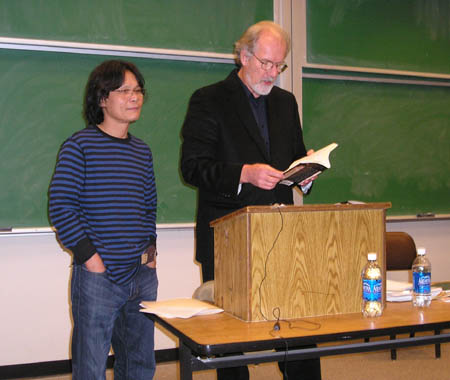Nguyen Do and Paul Hoover came to Sacramento State to do a bilingual reading of some of the pieces from their anthology of post-1956 Vietnamese Poetry entitled Black Dog, Black Night on Milkweed Editions.
They initially spoke of the importance of poetry in Vietnam as a vehicle to carry important information in Vietnamese culture and of the importance of belonging to the Vietnamese Writers Association, a distinction which confers immediate unquestioned status to its members and gives them the equivalent rank to that of major in the army.
In particular, the anthology examines the work of members of the Nhan Van (“Humanities”) movement, whose emphasis on freedom and expression found them at odds with the official poetry culture of the Vietnamese Writers Association and the government.
Van Cao, also a member of Nhan Van, and a composer found himself on the outside of the accepted norm in spite of the fact that he is the composer of the Vietnamese national anthem.
Nguyen Do was, himself, asked to leave Vietnam in the early 90’s when he came to the United States. Nguyen Do’s work reflects an urban melancholy full of despair, if not downright nihilism. You can see and hear this in the poem he reads both in Vietnamese and in English”Unlucky Days” [2:14]
Another one of his pieces read by the author in Vietnamese and Paul Hoover in English is ”Headache” [1:39].
Hoover talked of his experiences in Vietnam meeting the top members of the Vietnam Writers Association and noting the extreme respect for authority that exists there. He also spoke of the great amount of cultural authority that poetry possesses in Vietnam, how, for example, he was whisked through the streets of Hanoi with the help of police cars in front and back of the “poetry motorcade” sounding their sirens all the way. For the American poet, his tales bordered and then crossed over into the surreal.
The two of them ended the evening by reading two pieces by Hoang Hung, one of the leading figures of the Nhan Van movement. The first one, Untitled [Where Do the Stairs Lead Us] was read by Nguyen Do in Vietnamese first and then by Paul Hoover in English [1:43].
Finally, Paul Hoover read Hoang Hung’s “The Smell of Rain [1:35] and offered a brief commentary on how he came to be trusted to participate in the translations of the work in the anthology.
At one point Nguyen Do chided Paul Hoover that Paul would sing the English translation of the poem. To which Paul looked up and rather quizzically asked “Sing?” so it is with heavy heart that I must inform everyone there is no digital record of Paul singing any luc bat that night.





